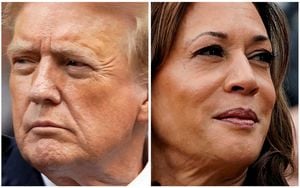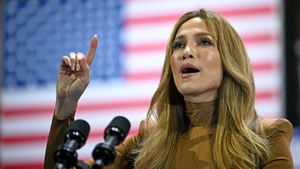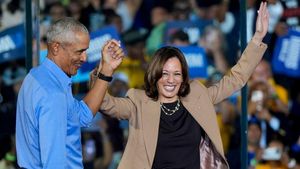Hyderabad — The push for a detailed caste census has gained significant momentum in Telangana, with the Congress party stepping forward to advocate for this long-debated issue. Meeting at Gandhi Bhavan, senior leaders, including Telangana Pradesh Congress Committee (TPCC) president Mahesh Kumar Goud and Chief Minister A. Revanth Reddy, discussed the urgency of conducting this census, aimed at enhancing representation and addressing the socio-economic disparities faced by marginalized communities.
During this high-profile meeting, Goud revealed plans to finalize the comprehensive caste census by December 7, marking what many believe to be a pivotal step toward social justice. “Rahul Gandhi has championed this vision for the nation, advocating representation proportional to each community’s presence,” said Goud, emphasizing the need to address past oversight.
To highlight the situation's urgency, Goud referenced activist Teenmar Mallanna's challenge to Harish Rao, the Minister for Finance and Civil Supplies. “If he has the courage, let Harish Rao resign-then we’ll see the truth,” Goud quipped, pointing to the lack of accountability within the previous government.
This inclusive approach seeks insights from various social groups and civil society members and involves gatherings slated for November 2 to address caste survey issues with grassroots leaders. Goud stressed the importance of gathering inputs from all corners of society, including caste associations and intellectual circles, to craft policies rooted in genuine representation.
Revanth Reddy echoed this sentiment, reinforcing his commitment to ensuring the census not only illuminates the demographic makeup of the state but also becomes the bedrock for effective resource allocation. He noted, “This isn’t just an X-ray; it’s a mega health check-up for social equity. Our aim is to distribute government resources fairly.”
Recently, the ruling Congress party has been vocal about demanding the Union government conduct the OBC caste census as part of the broader decennial census scheduled for 2025. Goud noted the significance of this census, stating, “While the SC/ST census will go on, it’s imperative we include OBCs too.”
The commitment to push these agendas reflects not only Congress's accountability but signifies its bid to reconnect with voters disillusioned by the previous administration’s failures.
Another significant voice in this conversation has been Revanth Reddy, who has also acknowledged the past promises made by Congress leaders during campaigns, particularly when Rahul Gandhi openly supported comprehensive caste enumeration during his ‘Bharat Jodo Yatra’. This clarity of purpose serves to galvanize party members and allies alike as they prepare to transition this aspirational framework for the cadre.
“It’s our responsibility to uphold Rahul’s word, beyond personal identity. This is about fulfilling our role as protectors of the commitment made by the Gandhi family,” insisted Revanth, emphasizing the unity the party aims to instill.
With plans for effective coordination through designated observers across districts and immediate communications with the Centre, the Congress party hopes to hold the previous regime accountable for its lack of effort toward socio-economic surveys. Goud reiterated disapproval of the prior administration’s failed attempts, asserting, “Our State has taken no missteps concerning the BC Corporation.”
The spotlight on caste census and representation extends beyond political rhetoric and taps deeply entrenched societal principles. Observers believe this issue will not just reshape political tactics but also redefine social dynamics within Telangana, enforcing the narrative of social justice.
“A caste census serves as a compelling tool for delineing the needs of marginalized communities—ensuring they receive their rightful place in the quest for social equity and justice,” contended Nusrat Jan, a commentator on the socio-political climate of India. She warned, “This will also challenge the political dominance of the current ruling party as the upcoming elections will test their grip should these marginalized voices unify.”
Calls for caste census have been increasingly pertinent, especially as groups rally together for comprehensive data reflecting the country’s demographic diversity. “Our aim must not only be to distribute government resources fairly but also to expose the myriad socio-economic realities these groups face—enabling informed policymaking,” he stated.
Yet, the stakes are high for political entities such as the Bhartiya Janata Party (BJP) as they navigate this environment. Strikingly, opposition parties perceive the drives for caste census as not only social justice pursuits but also electoral strategies. By advocating for the census and thorough representation, the Congress party hopes to consolidate support from specific demographics.
The ramifications of these discussions could reverberate well past 2024, particularly as the political stakes reach new heights with looming elections on the horizon.
While the conversations surrounding caste census are far from novel, the re-energized focus on them shows the public’s readiness for action—not just promises. The upcoming meetings will be instrumental, potentially determining the Congress’s footing as they aim to reclaim reputation and responsibility by tackling historical disparities and championing equal representation.
The backdrop of social change presents the optimal stage for discourse on caste dynamics. This exposure might shift allegiances and alter electoral fates, overlaying the complexity of caste relations within India's socio-political fabric. Yet, as leaders rally behind the caste census, the enduring challenges of prejudice and misrepresentation compel them to marshal resources effectively and inclusively.
The debate also raises thought-provoking questions about the intersections of caste and economic standing: Can one’s financial ascent within these socioeconomic classes alter their social stature? The complex reality suggests achieving economic uplift does not necessarily erase ingrained prejudices stemming from caste affiliation. The legitimacy of these discussions emphasizes the need for balanced narratives moving forward.
Only through sustained efforts and systemic change can genuine social equity coexist with economic progress, affirming the need for multifaceted strategies aimed at promoting inclusive development. It remains to be seen how these initiatives will translate when faced with ground realities and whether they will fulfill the political and social aspirations they promise to uphold.



